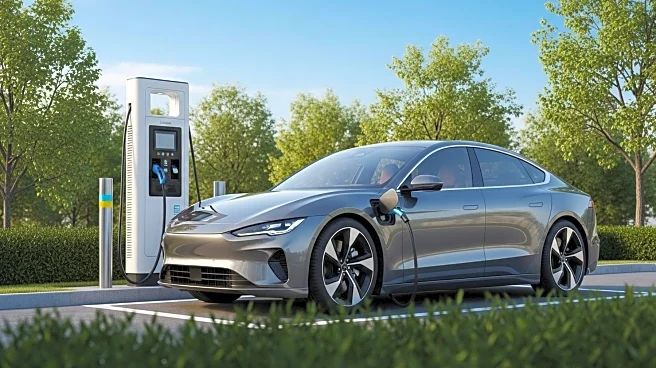What is the story about?
What's Happening?
Volkswagen Group has solidified its position as a leader in the European electric vehicle (EV) market, with Skoda achieving notable success. In July, Skoda's Elroq and Enyaq models secured the top two positions in EV sales, marking a significant achievement for the Czech brand. The Elroq, a compact crossover, registered 8,701 units, while the Enyaq followed with 6,943 units, representing a 46% year-over-year sales increase. This performance has contributed to Volkswagen Group's dominance, with a 28% market share in the European EV sector. The overall market saw 302,000 plugin vehicle registrations in July, a 40% increase from the previous year, indicating strong growth in the EV segment.
Why It's Important?
The success of Skoda within the Volkswagen Group highlights the growing mainstream acceptance of electric vehicles in Europe. As Skoda's models gain traction, it signals a shift towards more affordable and competitive EV options, potentially increasing consumer adoption. Volkswagen Group's leadership in the market is crucial as it competes with other major players like Tesla and BYD. The rise of plugin hybrids, which accounted for 37% of all plugin car sales in July, further underscores the diversification of the EV market. This trend could influence global automotive strategies, encouraging manufacturers to invest more in electric and hybrid technologies.
What's Next?
Volkswagen Group is expected to continue its strong performance in the European EV market, with Skoda poised to maintain its momentum. The introduction of new models, such as the Skoda Epiq, could further bolster the brand's presence. As competition intensifies, other manufacturers may need to innovate and adjust their strategies to keep pace. The evolving market dynamics could lead to increased investment in EV infrastructure and technology, potentially accelerating the transition to electric mobility across Europe.
Beyond the Headlines
The success of Skoda and Volkswagen Group in the EV market may have broader implications for the automotive industry, including potential shifts in manufacturing priorities and supply chain strategies. As EVs become more mainstream, there could be increased pressure on governments to support infrastructure development and incentivize electric vehicle adoption. Additionally, the rise of affordable EV options may challenge premium brands to differentiate themselves through technology and design.
















